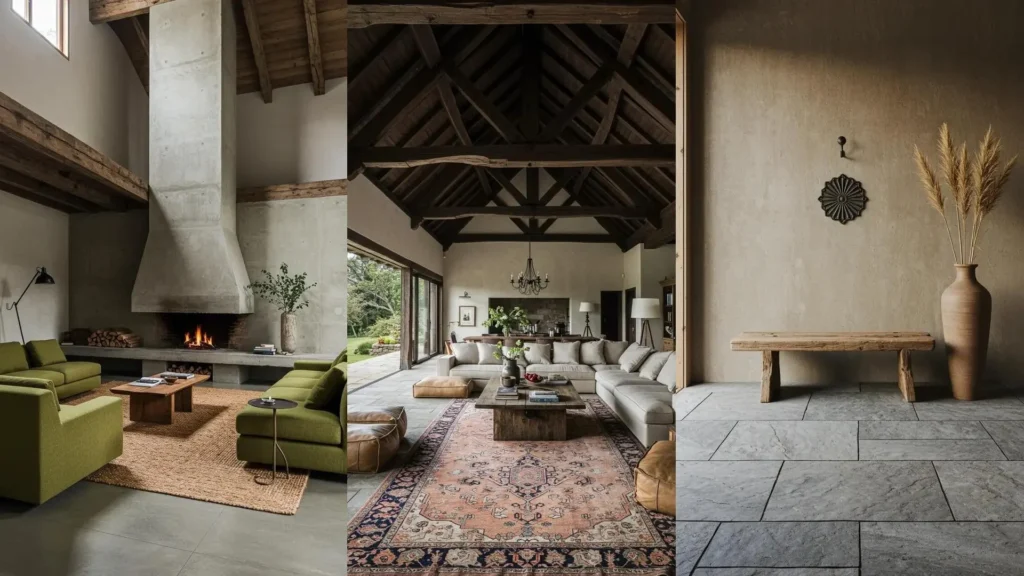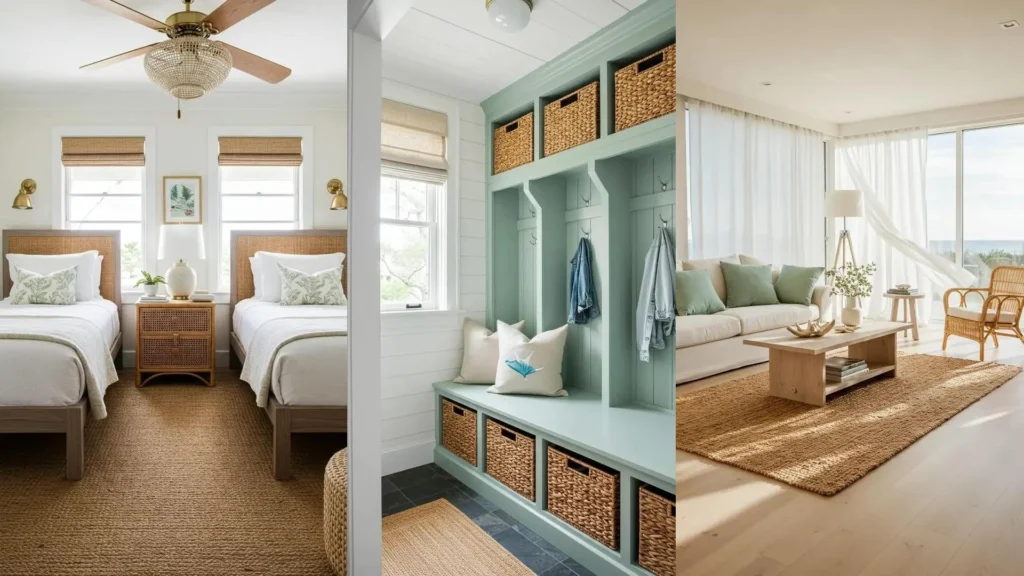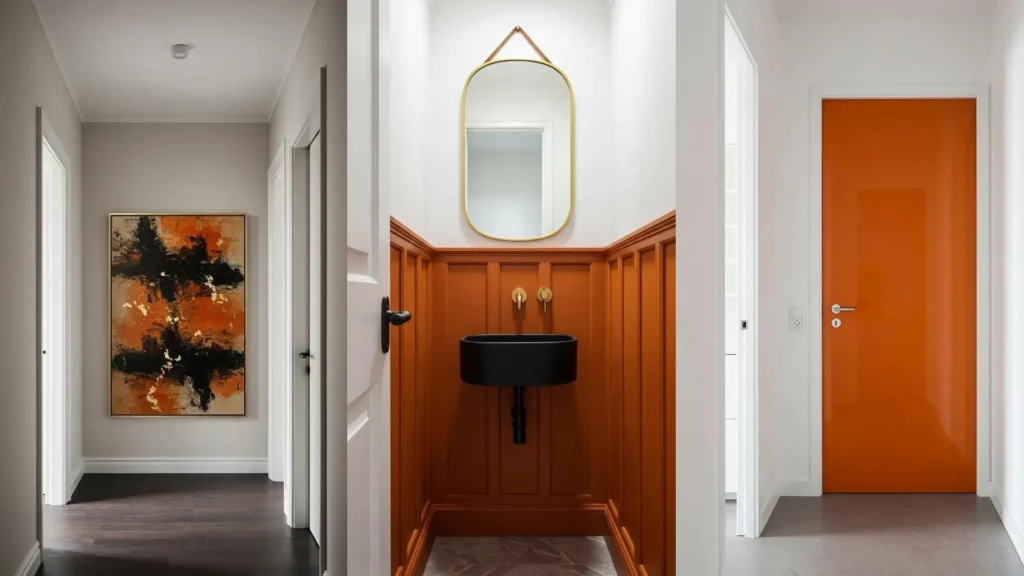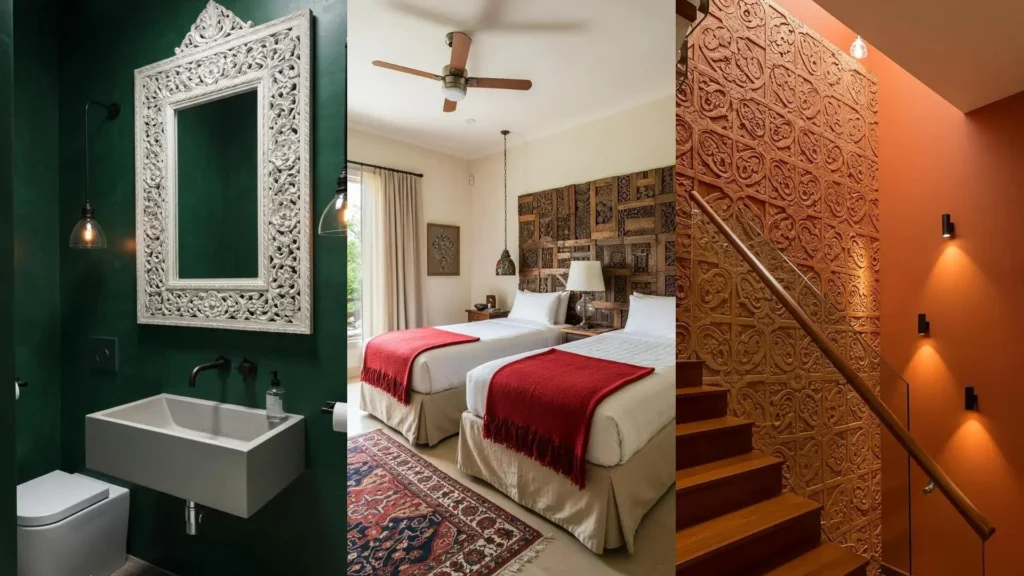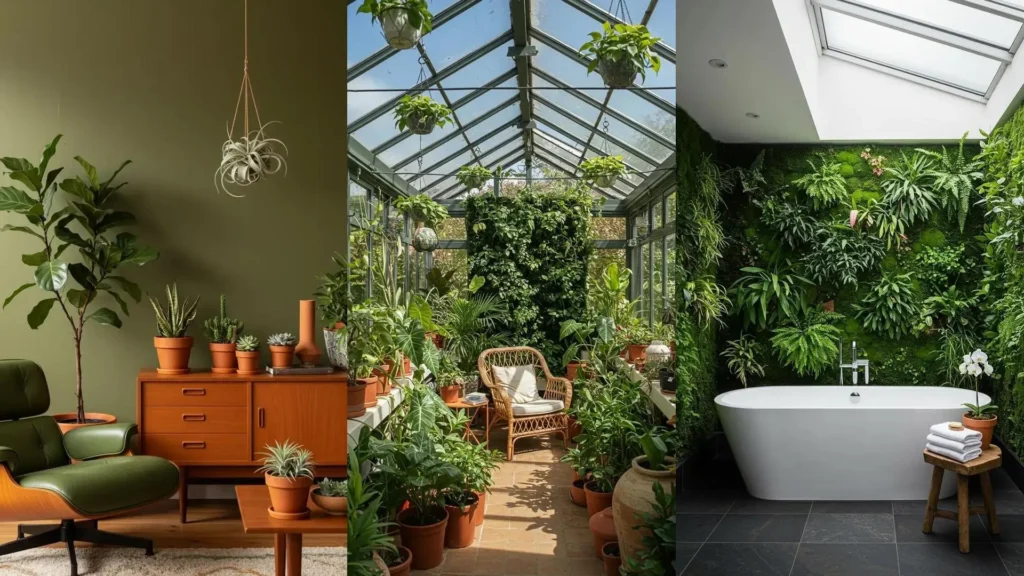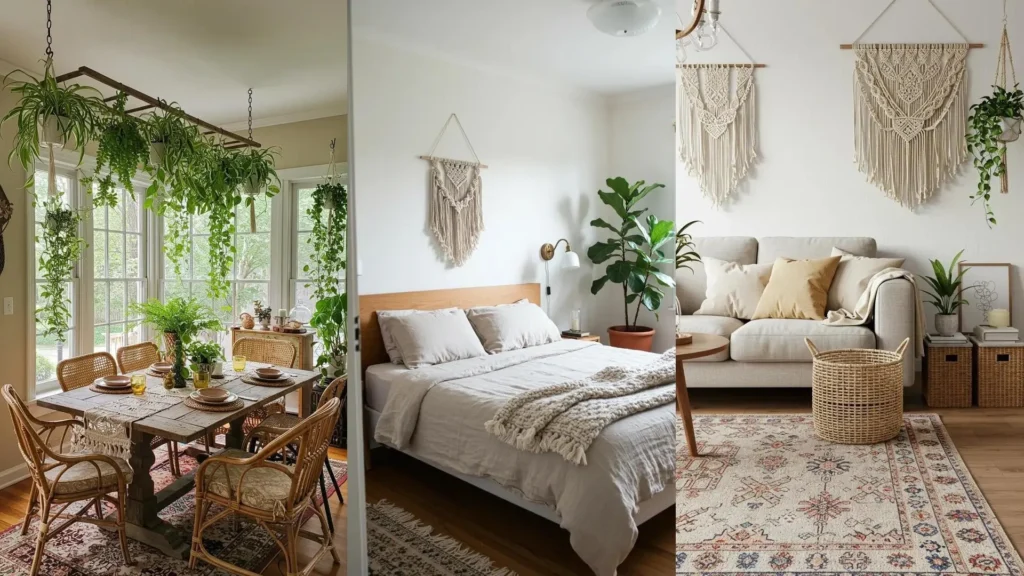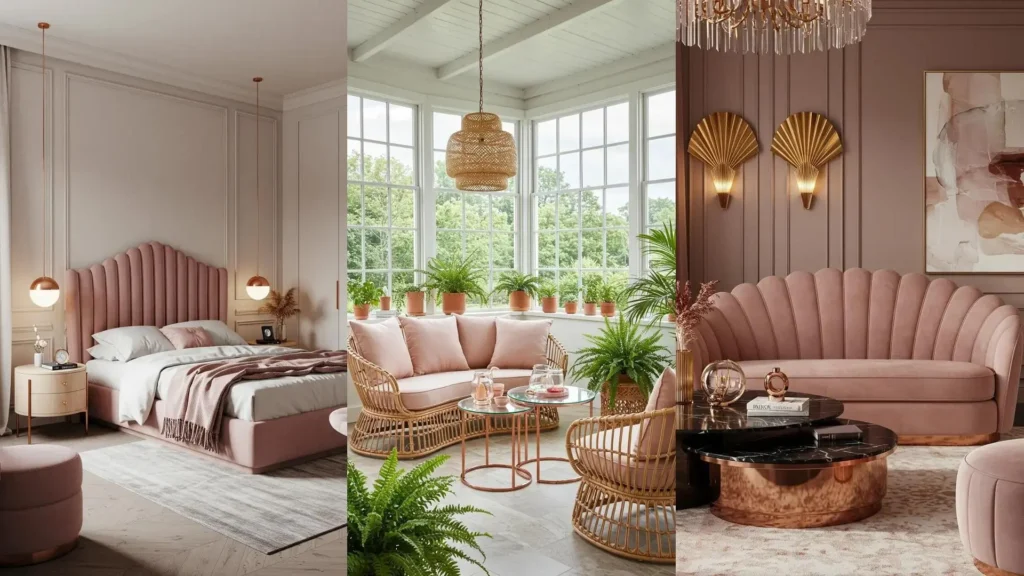Your home should be a sanctuary, a place that calms your mind and reflects who you are—not a space that demands perfection.
This is the heart of Wabi-sabi, a design philosophy that finds profound beauty in imperfection, authenticity, and the passage of time.
It’s about choosing natural materials that age gracefully, embracing textures that feel honest, and creating an atmosphere of quiet contemplation.
Forget fleeting trends. Here, you will discover how to cultivate a home that feels soulful, grounded, and deeply, beautifully yours.
1. Embrace the Art of Textured Walls
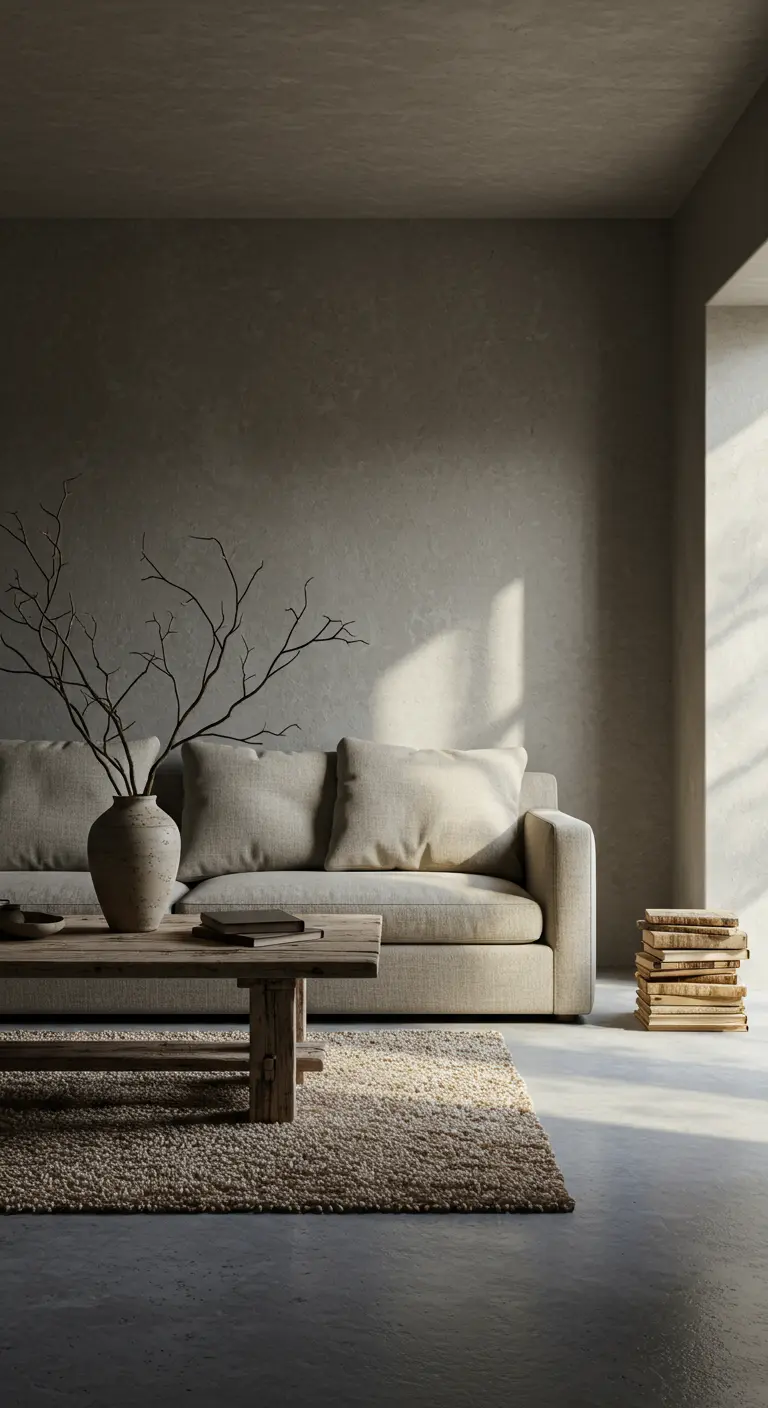
Move beyond flat paint and introduce walls with depth and subtle movement.
Achieve this tactile effect with limewash, Roman clay, or tadelakt plaster, which create a soft, chalky finish that beautifully catches the light.
These finishes add a layer of organic warmth that serves as a quiet backdrop for simple furnishings.
For a simpler approach, try a matte-finish paint in a complex neutral like greige or taupe and apply it with a brush for visible, imperfect strokes.
Notice how this single element transforms the entire atmosphere, creating one of those warm, earth-tone rooms that feel instantly grounding.
2. Choose Bedding That Breathes and Ages Gracefully
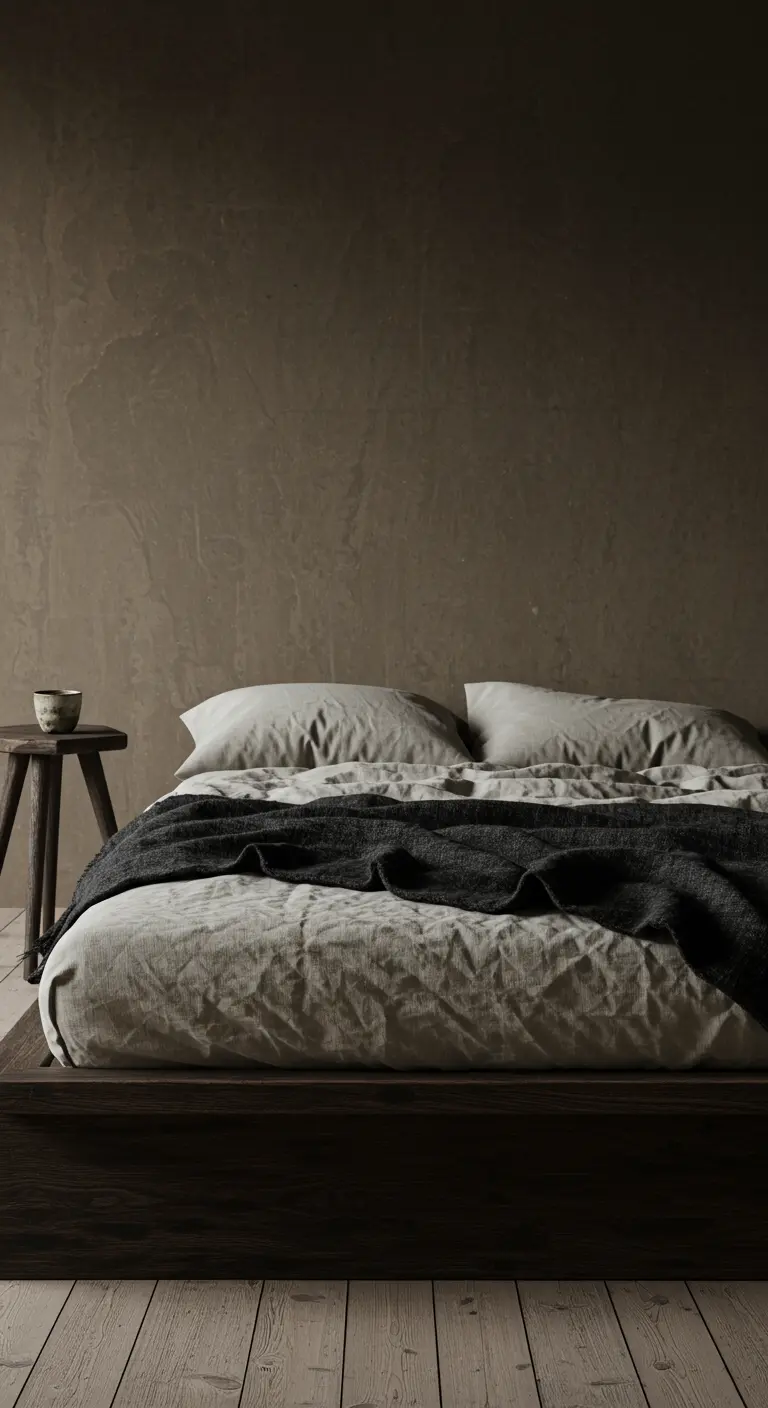
Swap crisp, perfect bedding for the relaxed elegance of natural linen or stone-washed cotton.
The beauty of these materials lies in their inherent texture and subtle wrinkles, which add a layer of visual softness and comfort.
Opt for a muted, earthy color palette—think stone, charcoal, or oatmeal—to create a serene sleep sanctuary.
This is a small change with a significant impact, turning your bed into an invitation for rest rather than a perfectly staged display, echoing the feel of chic monochrome gray bedroom retreats.
3. Curate Your Shelves with Intention
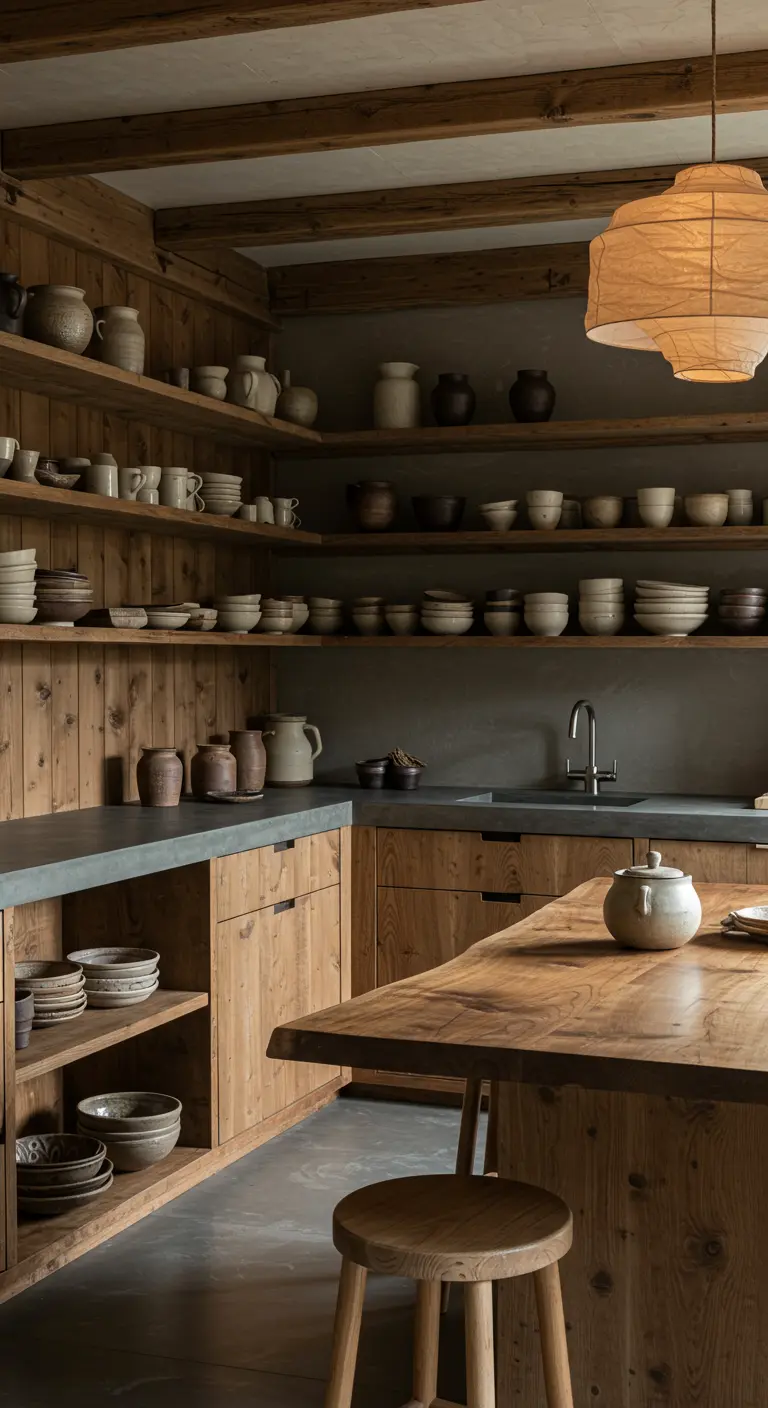
If you have open shelving, treat it as a gallery of your most-loved, everyday objects.
Group handmade ceramics by color or texture to create a composition that is both functional and beautiful, avoiding visual clutter.
The key is restraint; less is always more.
If maintaining perfectly styled shelves feels stressful, apply this principle inside your cabinets for a moment of private joy each time you open them, a common practice in many fusion kitchens.
4. Turn Bathing into a Mindful Ritual
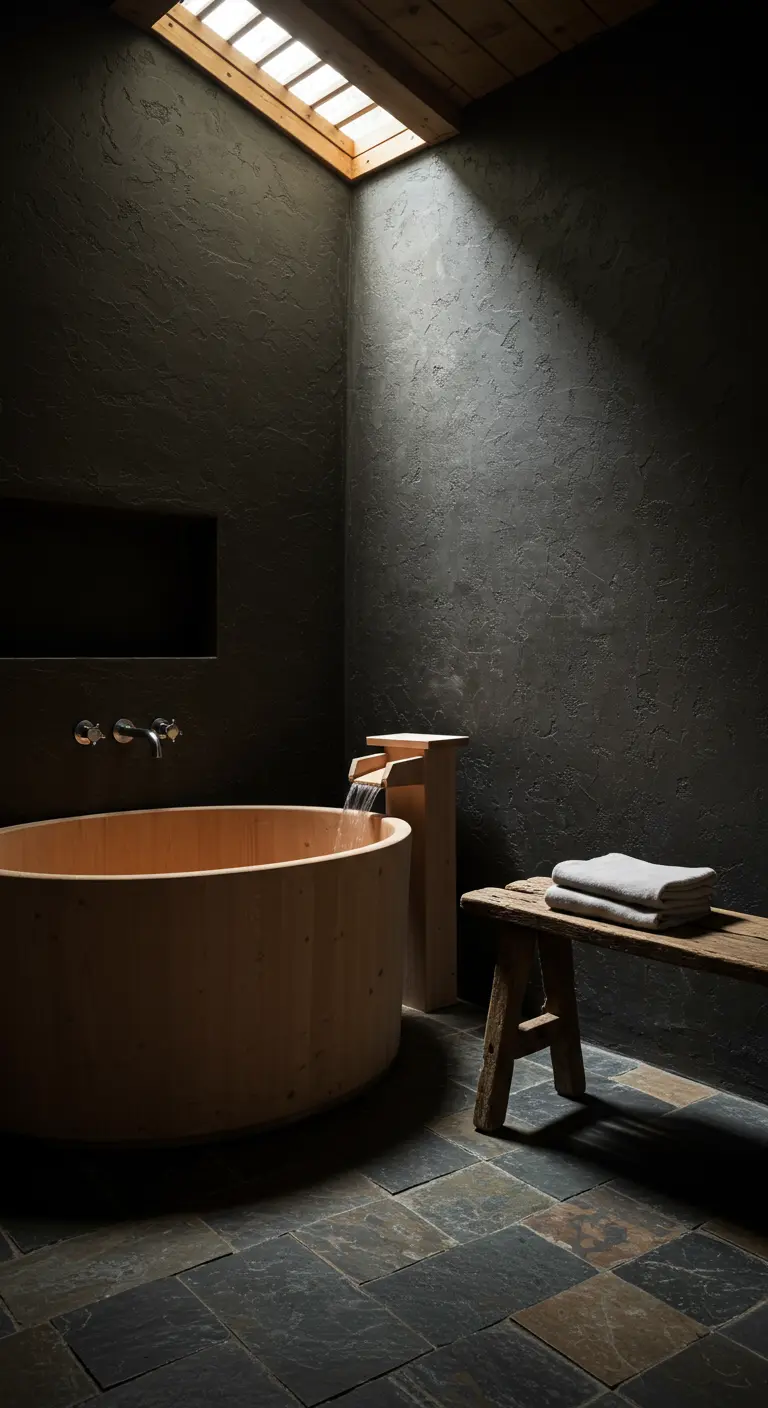
Elevate your bathroom by focusing on the experience of bathing, not just the function.
While a Japanese soaking tub is a beautiful investment, you can capture the essence by adding a simple, weathered wood bench for your towels and a single, high-quality bath linen.
Combine this with slate or stone floor tiles that feel grounding underfoot.
This approach transforms a utilitarian space into one of the most serene spa-like bathroom retreats, encouraging you to slow down.
5. Soften Your Space with Organic Lighting
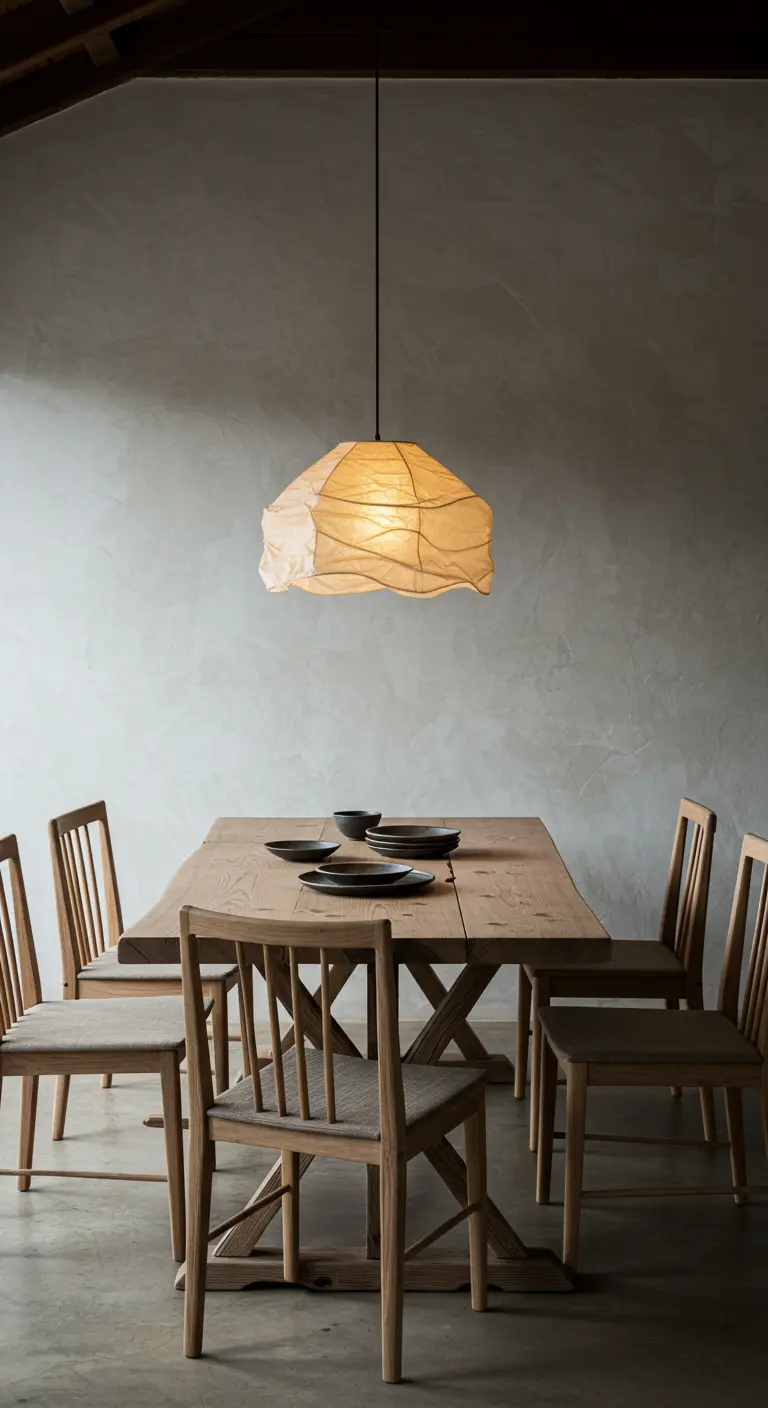
Replace a harsh, generic light fixture with one made from natural, light-diffusing materials.
A pendant made of paper, linen, or woven fibers casts a warm, gentle glow that eliminates sharp shadows and creates an intimate atmosphere.
The organic, imperfect shape of a fixture like this provides a beautiful contrast to the straight lines of a dining table or console.
This single swap is a hallmark of many Japandi interior ideas, and it can redefine your entire dining experience.
6. Designate a Place for Pause
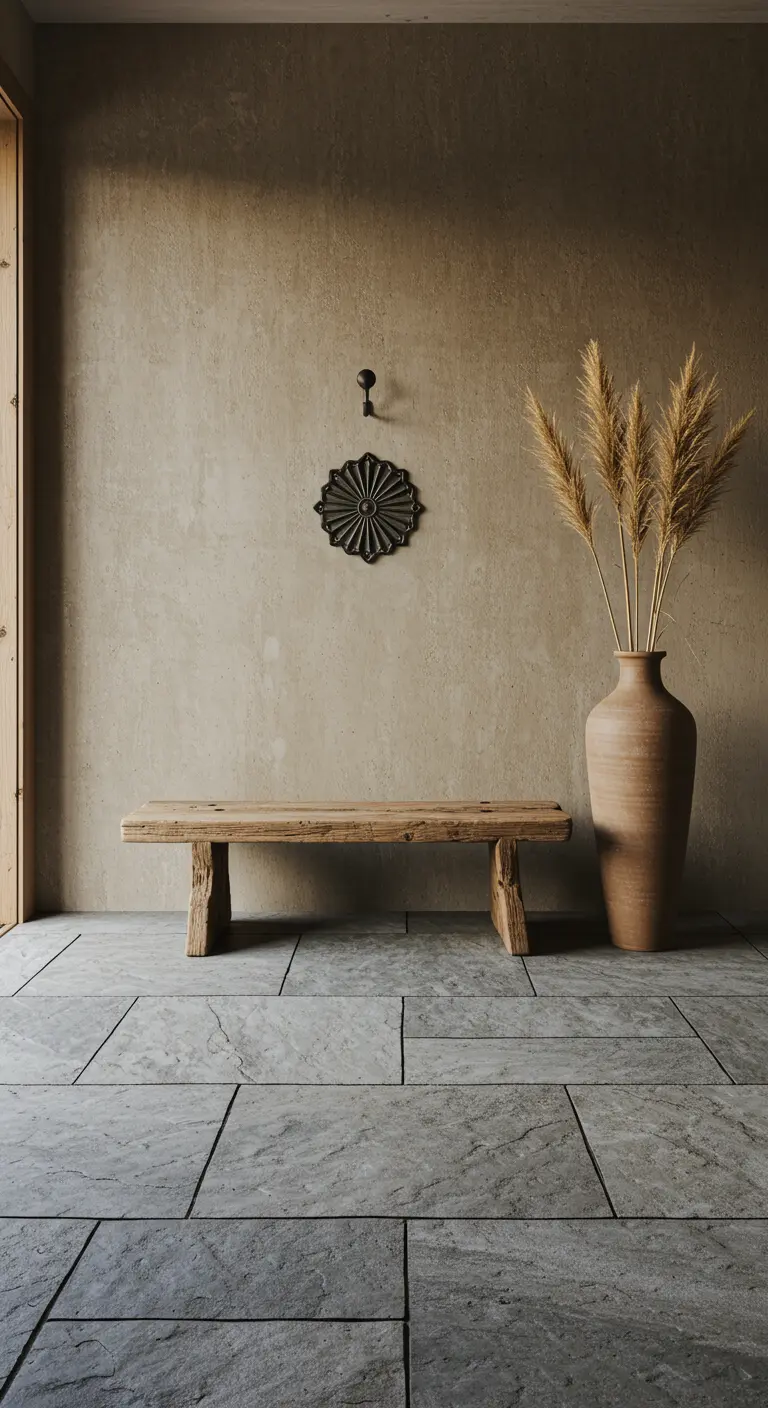
Even the smallest entryway or hallway can become a meaningful space.
Place a simple, unadorned wooden bench against a wall—its purpose is less about seating and more about creating a visual pause.
This invites a moment of transition as you enter or leave your home.
Accessorize with only one or two intentional items, like a sculptural vase with dried grasses or a single, interesting wall hook, showing how you can decorate a tiny entryway with purpose.
7. Find Beauty in Raw, Natural Forms
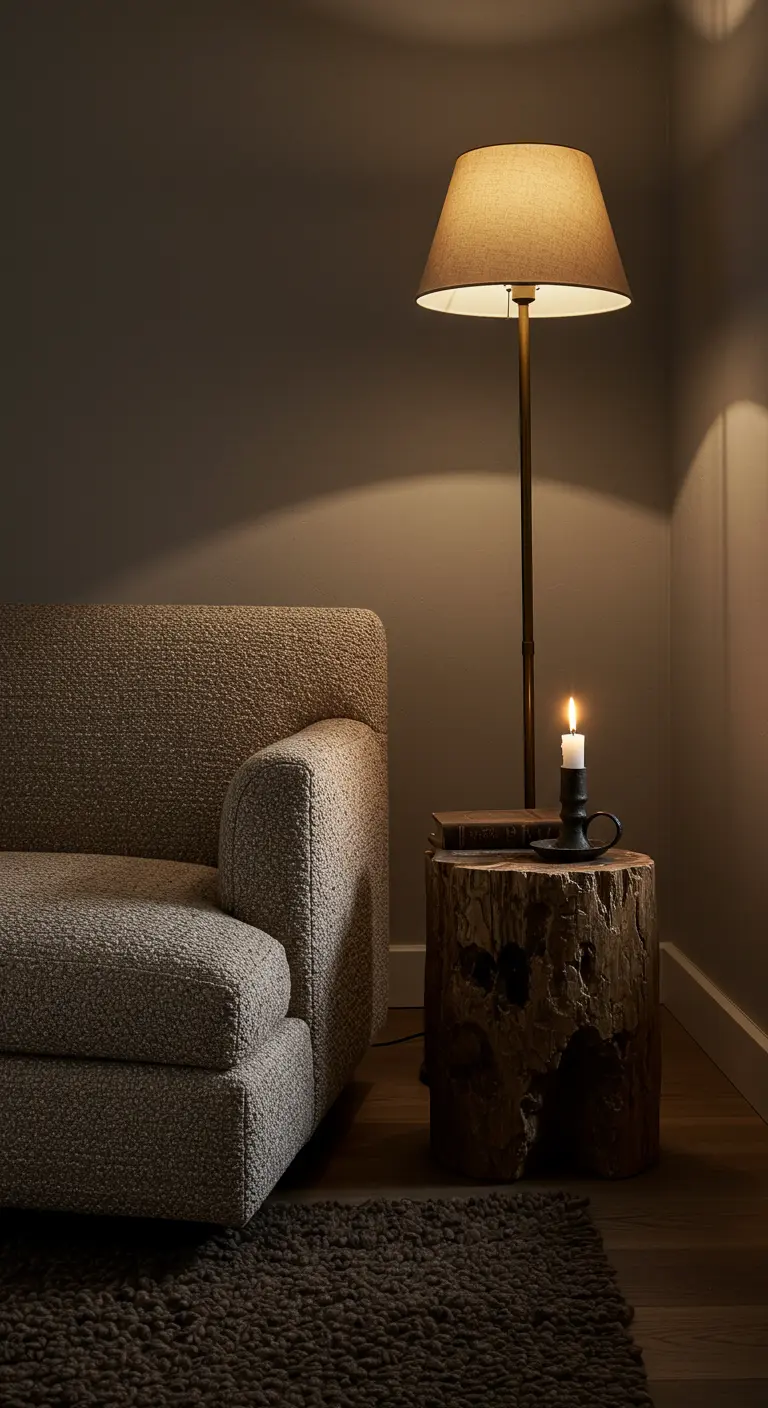
Incorporate a piece of furniture that feels as if it was minimally altered from its natural state.
A side table made from a raw tree stump or a reclaimed wood block brings an unrefined, powerful presence to a room.
Its cracks, knots, and uneven surface tell a story and provide a strong textural contrast to soft upholstery.
This is a simple way to ground cozy corners for small rentals or large living rooms with an element of untamed nature.
8. Let a Fireplace Command the Room
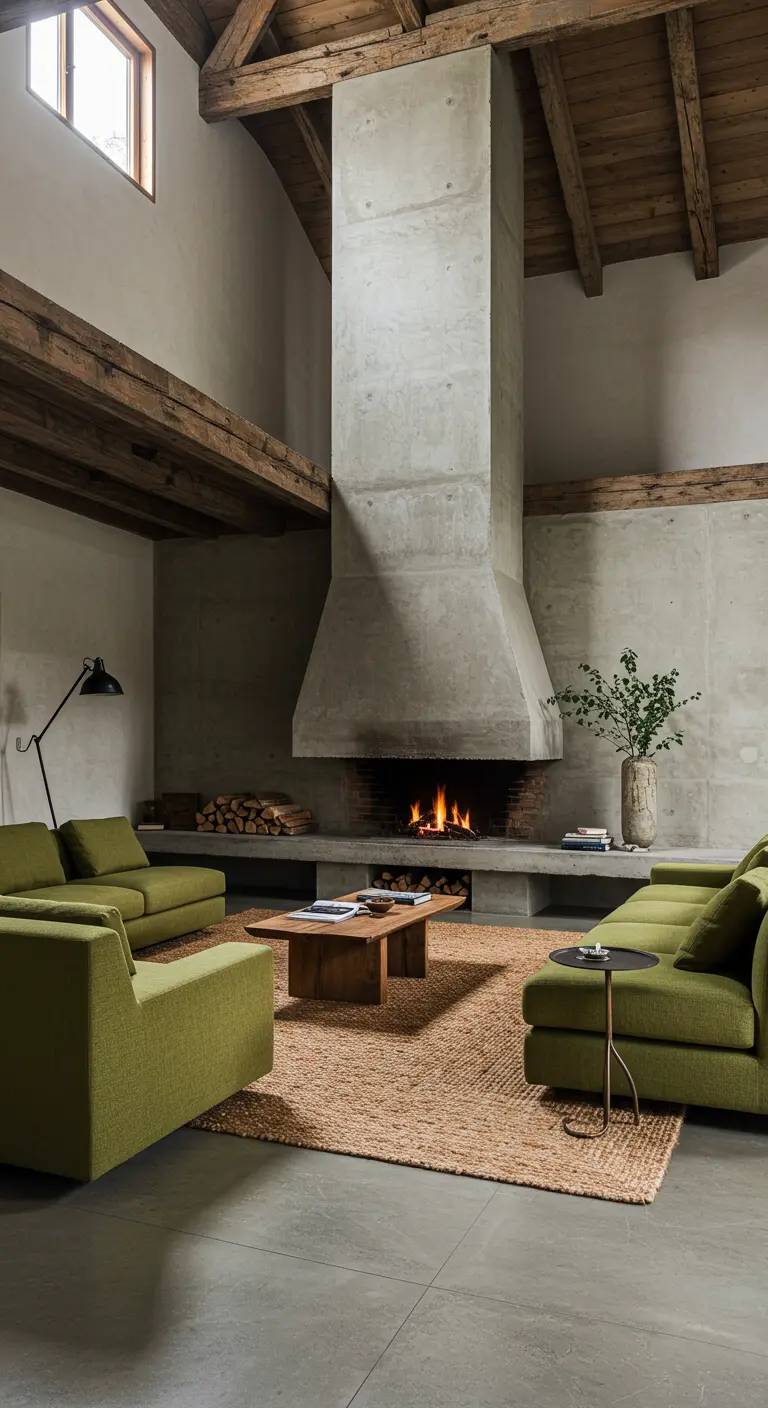
A fireplace is a natural focal point, so amplify its presence with monolithic materials like concrete or plaster.
Extending the material from floor to ceiling creates a sense of grandeur and permanence, while the raw texture keeps it from feeling cold.
Frame the setting with low, comfortable seating and a natural fiber rug to create an undeniable gathering spot.
This design choice is a key feature in many modern rustic hybrids, blending raw strength with comfort.
9. Create a Workspace That Inspires Stillness
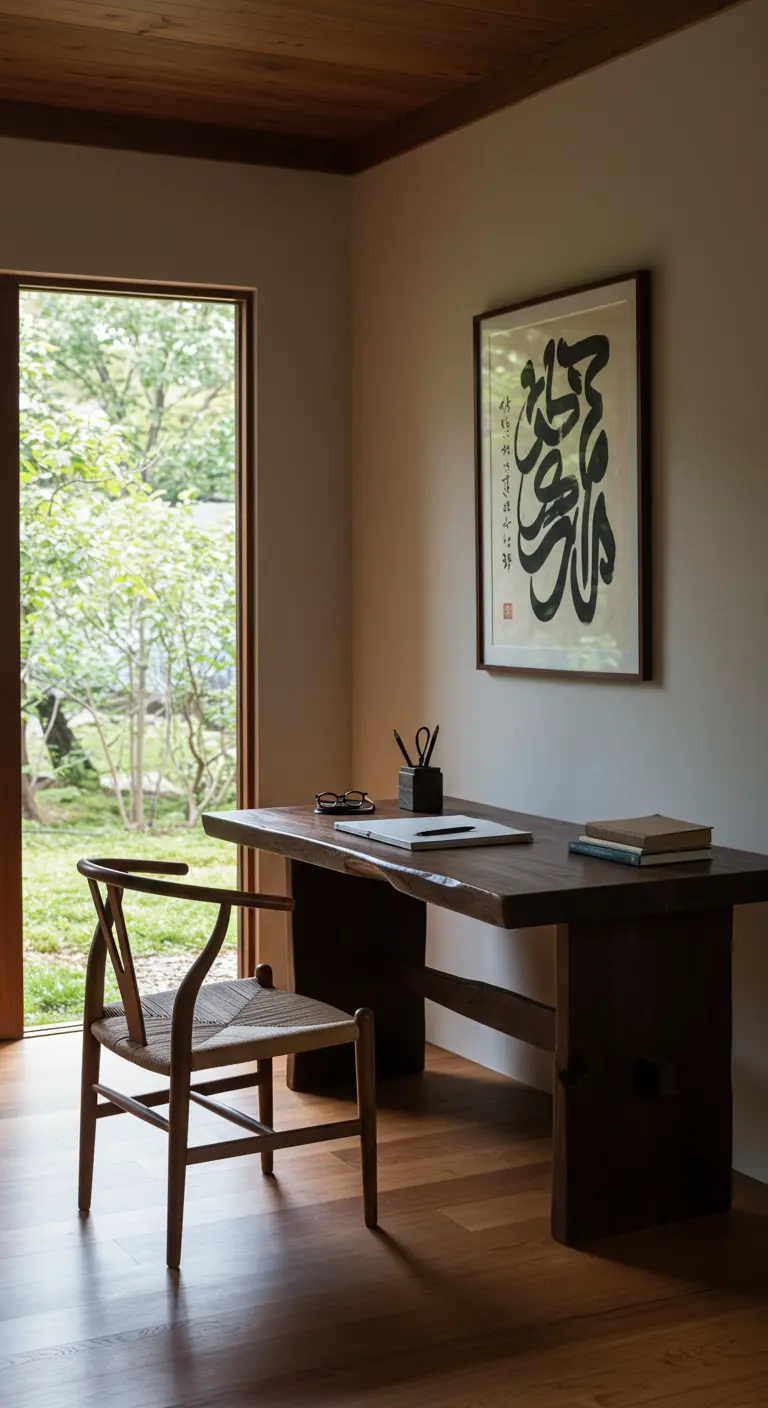
Designate a work area that prioritizes focus and calm over clutter and technology.
Choose a desk made of solid, dark wood with a visible grain and pair it with a chair that combines function with natural materials, like woven rush or caning.
Limit surface items to the absolute essentials and hang a single piece of meaningful art, like calligraphy, to set a contemplative tone.
This minimal approach turns your desk into one of those zen lounges for thought and productivity.
10. Marry Indoor Comfort with Outdoor Elements
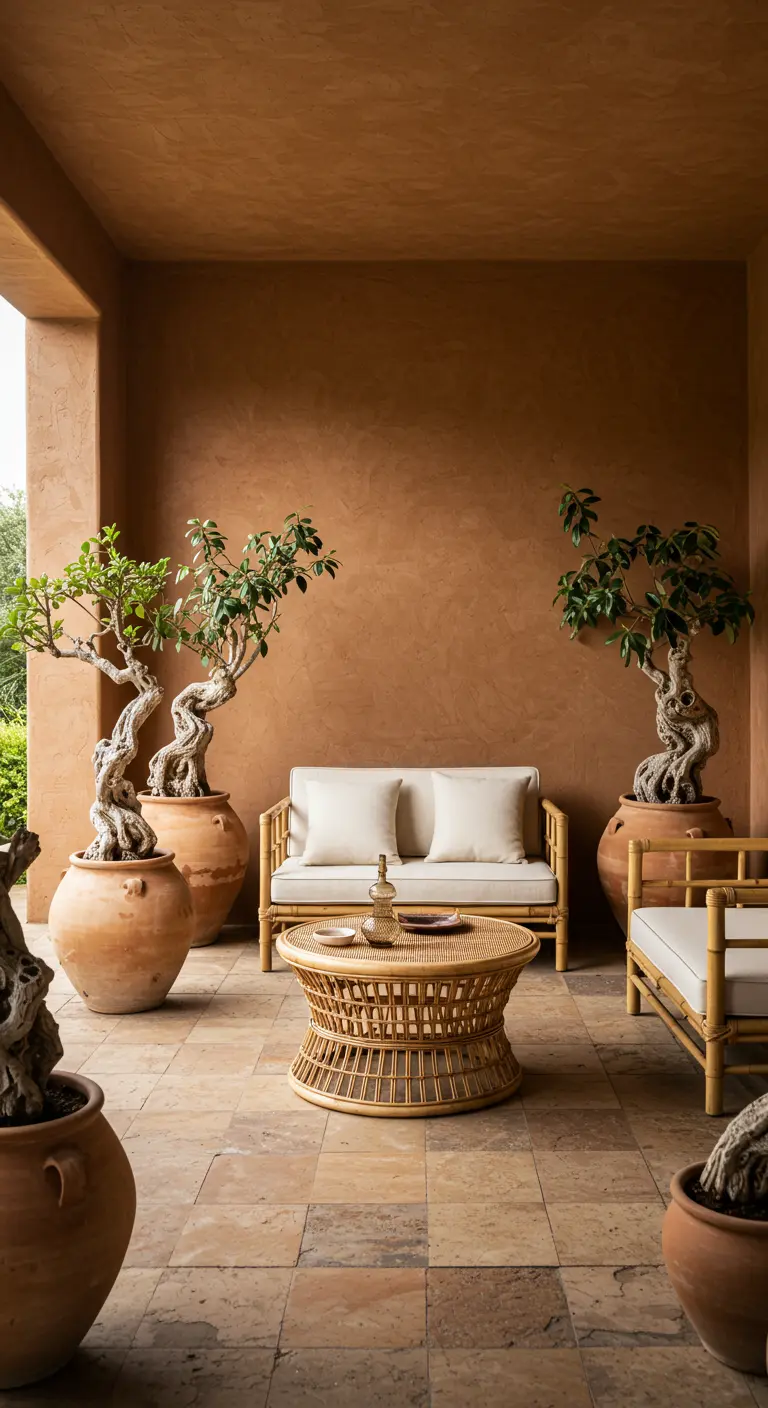
Blur the lines between your living space and the outdoors by creating a covered patio that feels like an extension of your home.
Use a cohesive color story—here, the terracotta walls are echoed in the oversized clay pots.
Furniture made of natural materials like bamboo and rattan, paired with comfortable cushions, makes the space inviting.
This concept of using natural clay and sun-drenched tones is central to creating warm, desert-inspired interiors.
11. Frame Nature as Your Ultimate Artwork
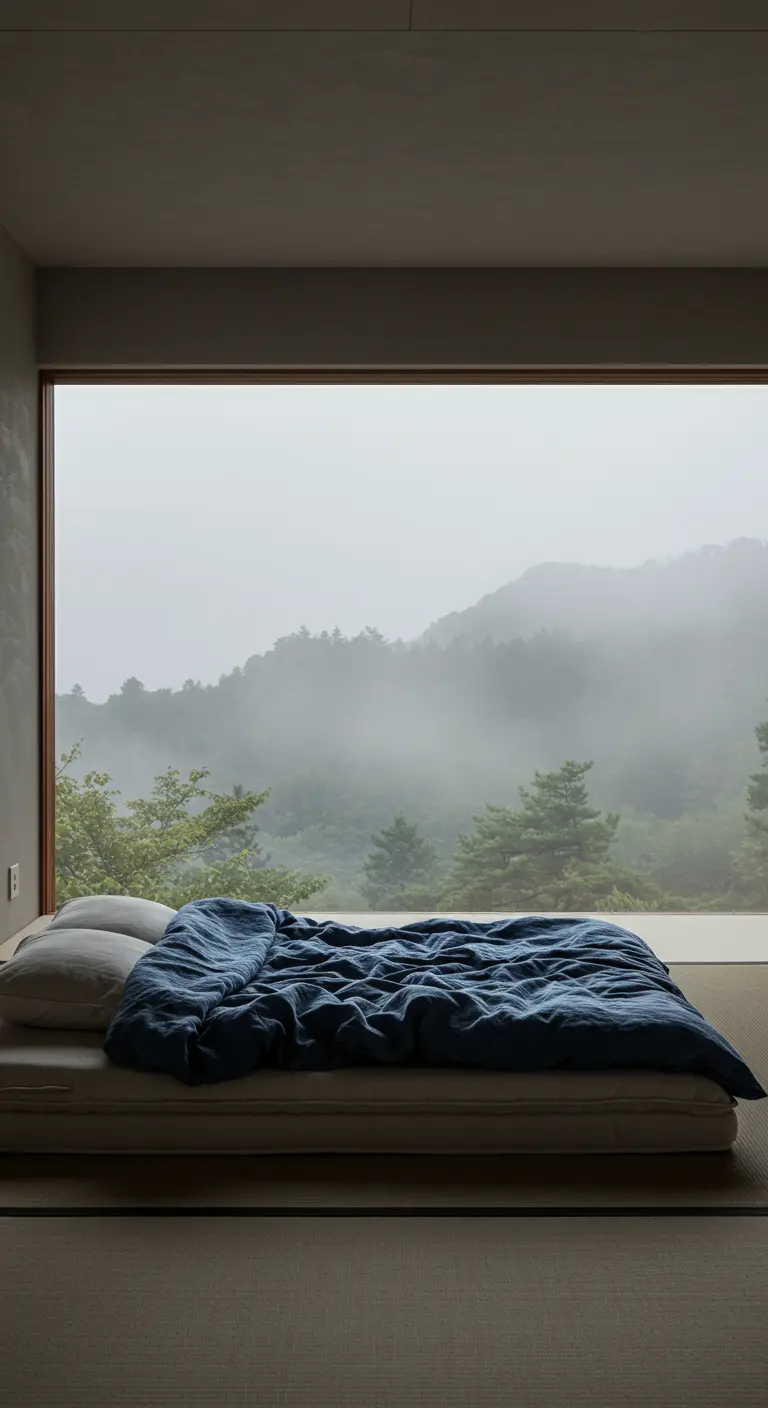
If you are lucky enough to have a beautiful view, make it the undeniable star of the room.
Keep the window frame simple and unobstructed by heavy drapes.
Position your furniture, like this low-profile bed, to directly face the landscape, allowing you to connect with the changing seasons and light.
The rest of the room’s decor can remain minimal, as no art can compete with nature’s own masterpiece, a feature often seen in romantic minimalist loft bedrooms.
12. Anchor Your Space with an Earth-Toned Rug
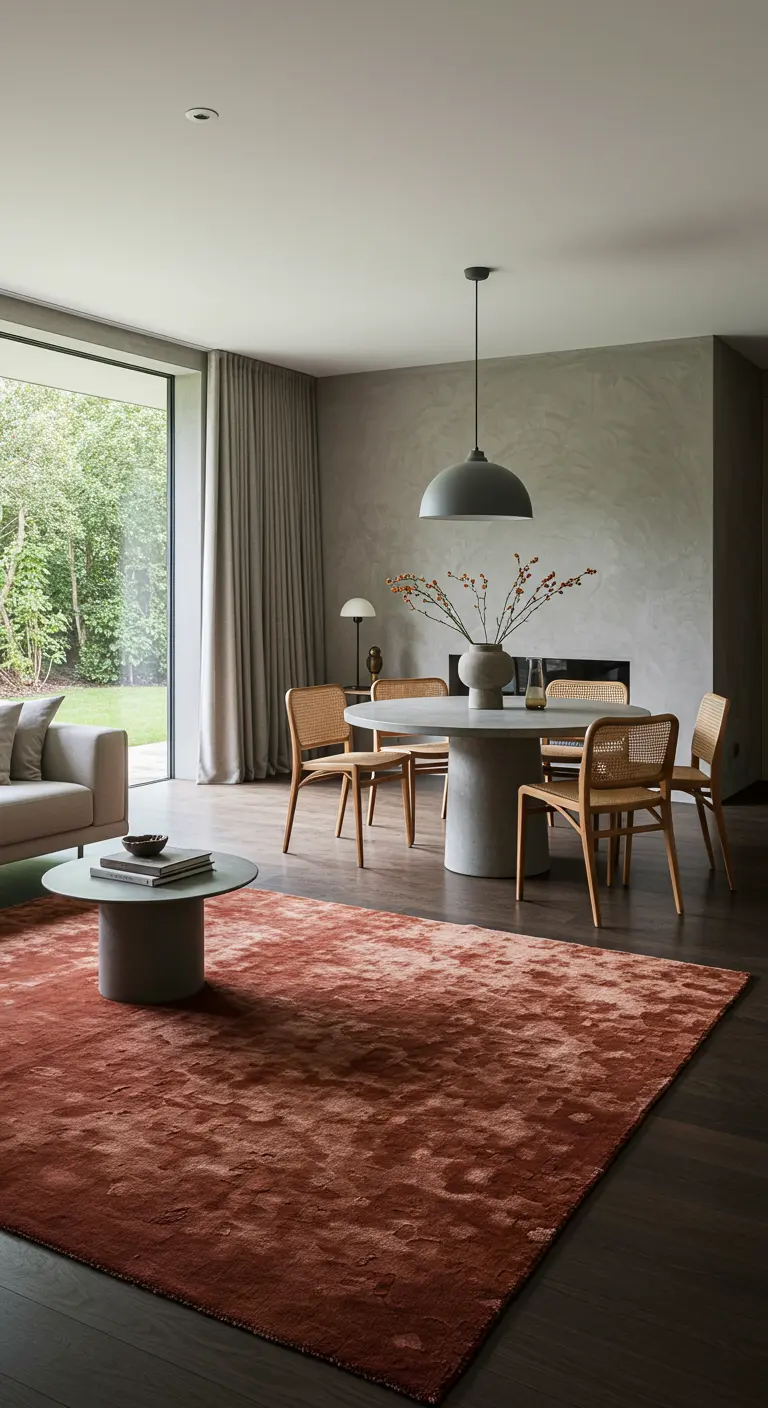
Ground your dining or living area with a large, richly colored rug in an earthy hue like terracotta, rust, or deep ochre.
This adds a foundational layer of warmth and color without overwhelming the senses.
Choose a rug with a subtle, abstract pattern or a deep pile texture to add visual interest that doesn’t demand attention.
It’s a powerful way to define a zone and make modern furniture feel more rooted, similar to the effect seen in boho-chic dining rooms.
13. Invite Living Nature into the Bathroom
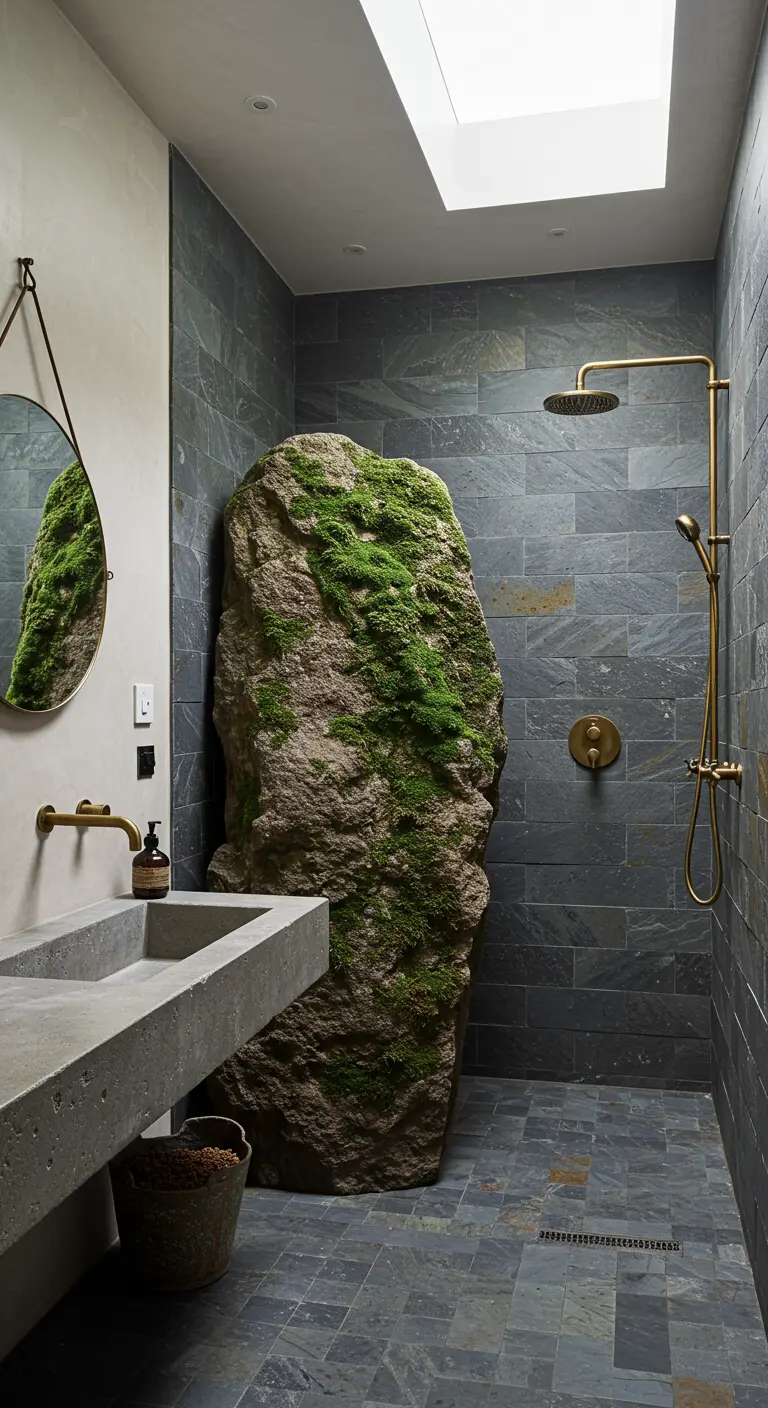
Introduce a bold, natural element to create a truly unique and restorative bathroom.
While bringing a moss-covered boulder indoors is an ambitious move, you can achieve a similar effect by incorporating a collection of moisture-loving plants like ferns and mosses.
Place them in stone planters or create a living wall to turn your daily shower into an immersive experience.
This approach is central to designing zen garden bathrooms that feel connected to the earth.
14. Celebrate Imperfection with Kintsugi
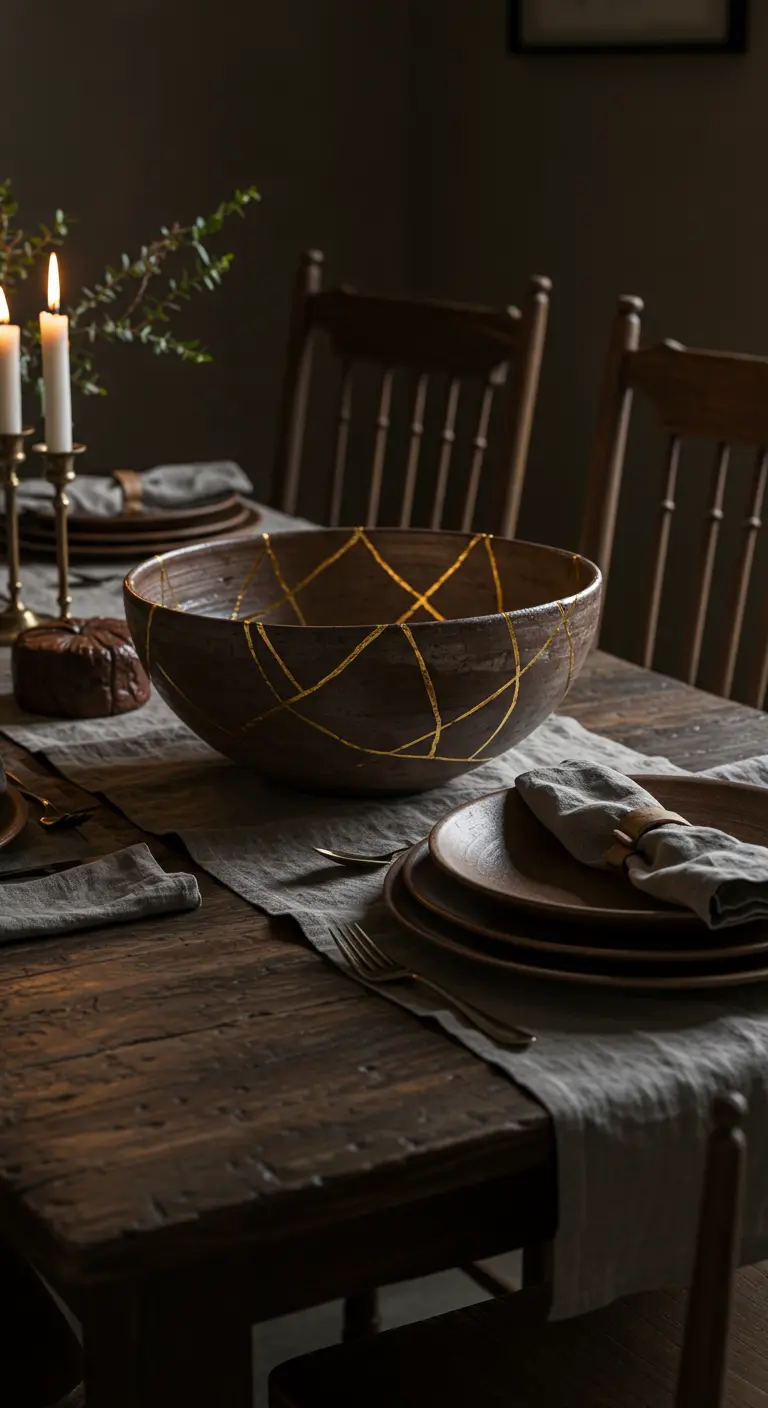
Embrace the philosophy of Kintsugi—the Japanese art of repairing broken pottery with gold lacquer—in your decor.
Display a Kintsugi-style bowl or vase as a centerpiece. It serves as a powerful metaphor for embracing flaws and history.
You don’t need an antique; you can find modern artisan pieces or even try a DIY kit to repair one of your own broken ceramics.
This intentional act of beautifying imperfection can inspire elegant fall table settings and everyday moments alike.
15. Expose the Bones of Your Home
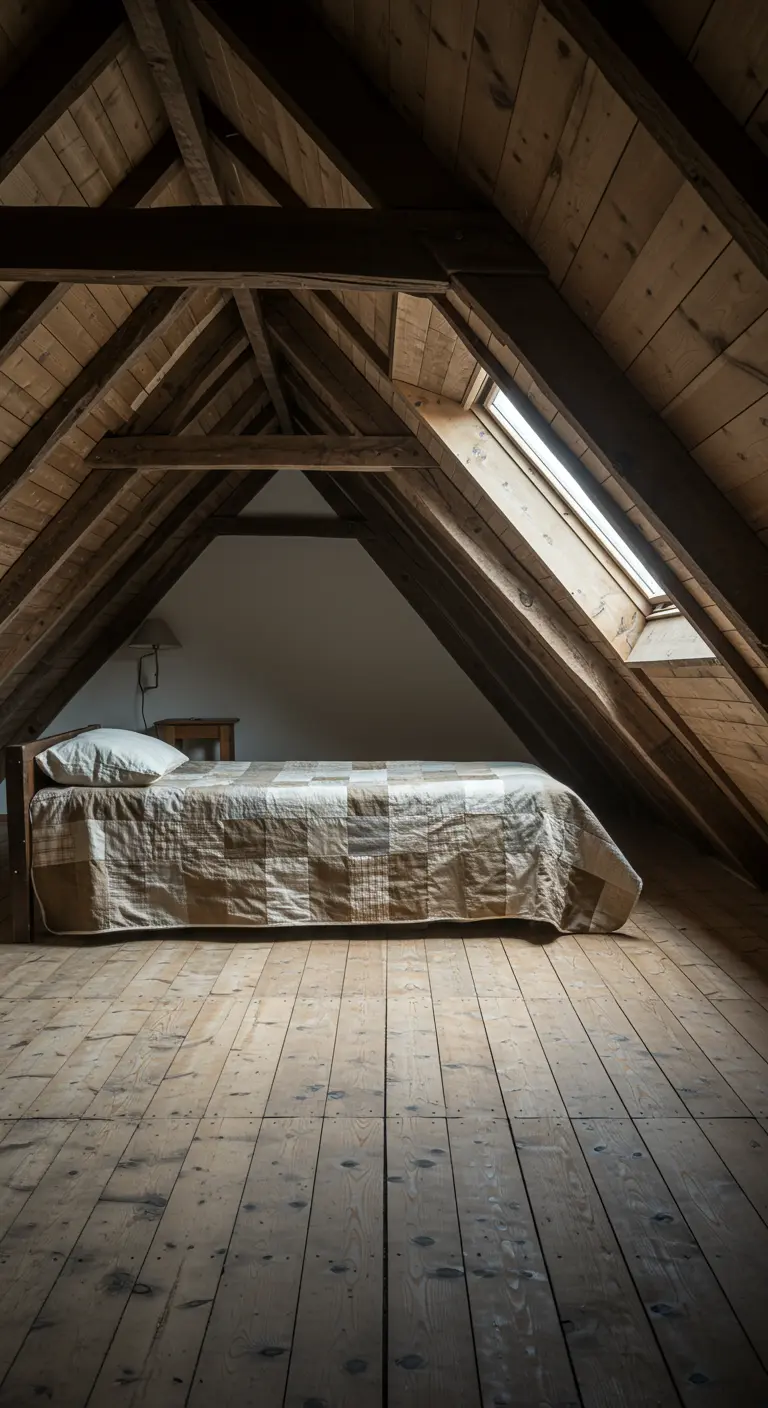
If you have an attic or a room with interesting structural elements, don’t hide them.
Exposed wooden beams, rafters, and original floorboards add immense character and a sense of history to a space.
Keep the surrounding decor simple to let the architecture speak for itself.
A simple bed dressed in a handmade quilt is all that’s needed to complete the feeling of a rustic, honest retreat, much like in romantic Scandinavian romance bedroom designs.
16. Master the Art of the Minimal Vignette

Create a focal point of profound simplicity on a console or countertop.
Instead of a cluttered collection, select just two or three objects with harmonious forms and textures.
A stoneware vase with a sculptural dried branch, paired with a simple lidded vessel, is enough to create a powerful, calming statement.
This practice of restraint is key to creating the elegant neutral palettes that define this style.
17. Balance Texture with Clean Lines
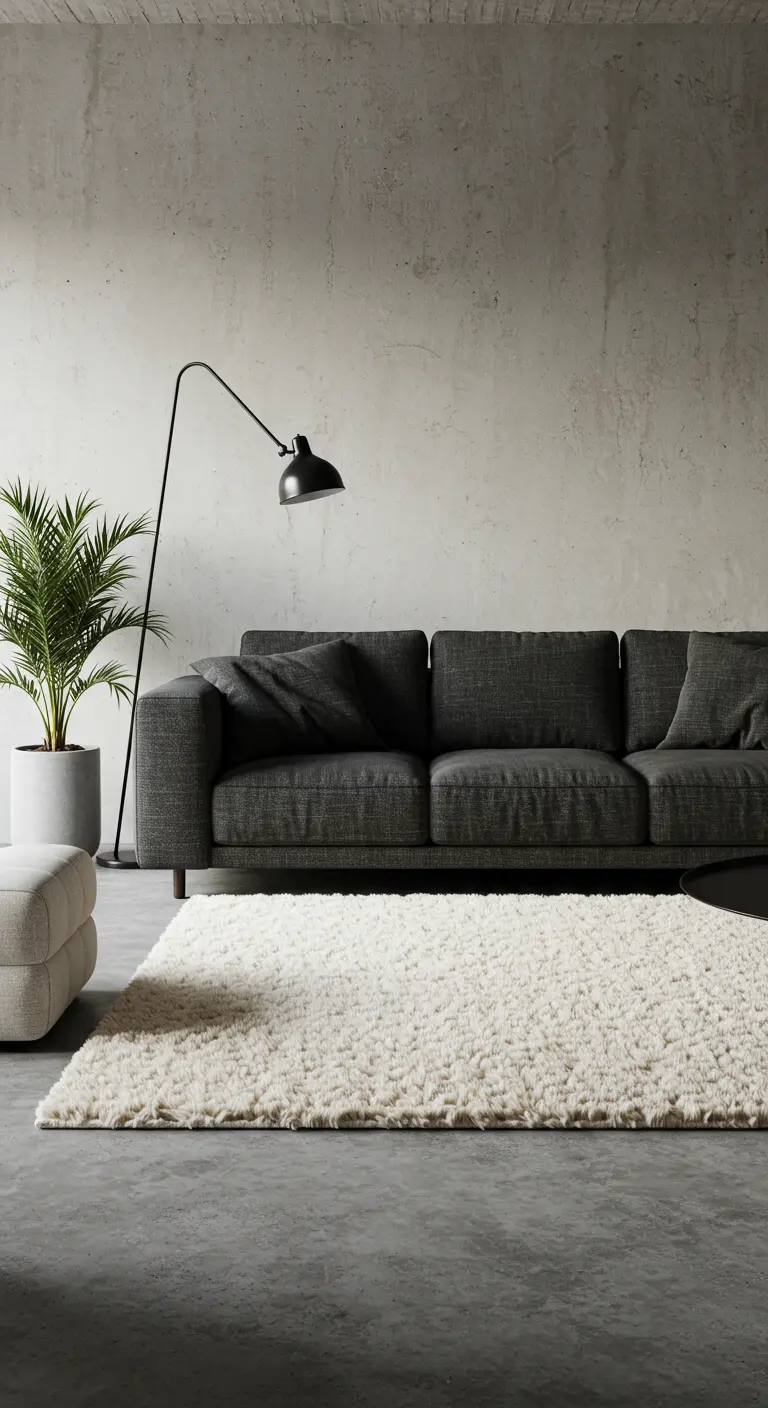
Achieve a sophisticated balance by pairing highly textured pieces with simple, modern forms.
Here, a deeply textured shag rug and a nubby bouclé sofa provide immense tactile interest.
These are balanced by the clean lines of the concrete floor and wall, and the minimalist arc of the floor lamp.
This high-contrast approach prevents the space from feeling either too sterile or too rustic, creating a dynamic harmony often found in elegant monochrome living rooms.
18. Create Calm with Low-Profile Furnishings
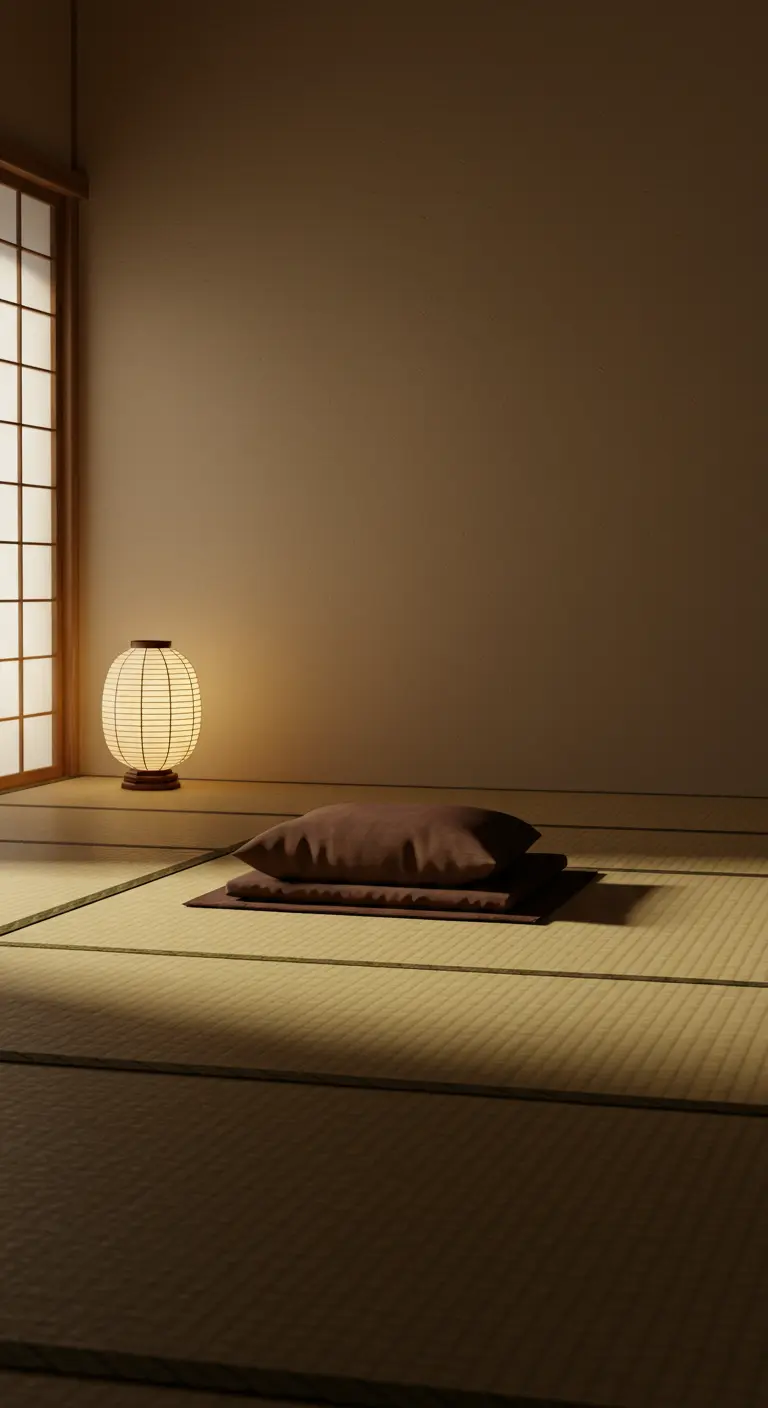
Lower the visual horizon of a room to create an immediate sense of calm and space.
In a meditation room or quiet corner, use floor cushions or a low mattress on tatami mats instead of traditional furniture.
This encourages a different, more grounded way of inhabiting the space.
A single paper lantern placed on the floor provides soft, ambient light, completing the serene atmosphere of these contemporary zen homes.
19. Combine Raw Wood and Sculpted Stone
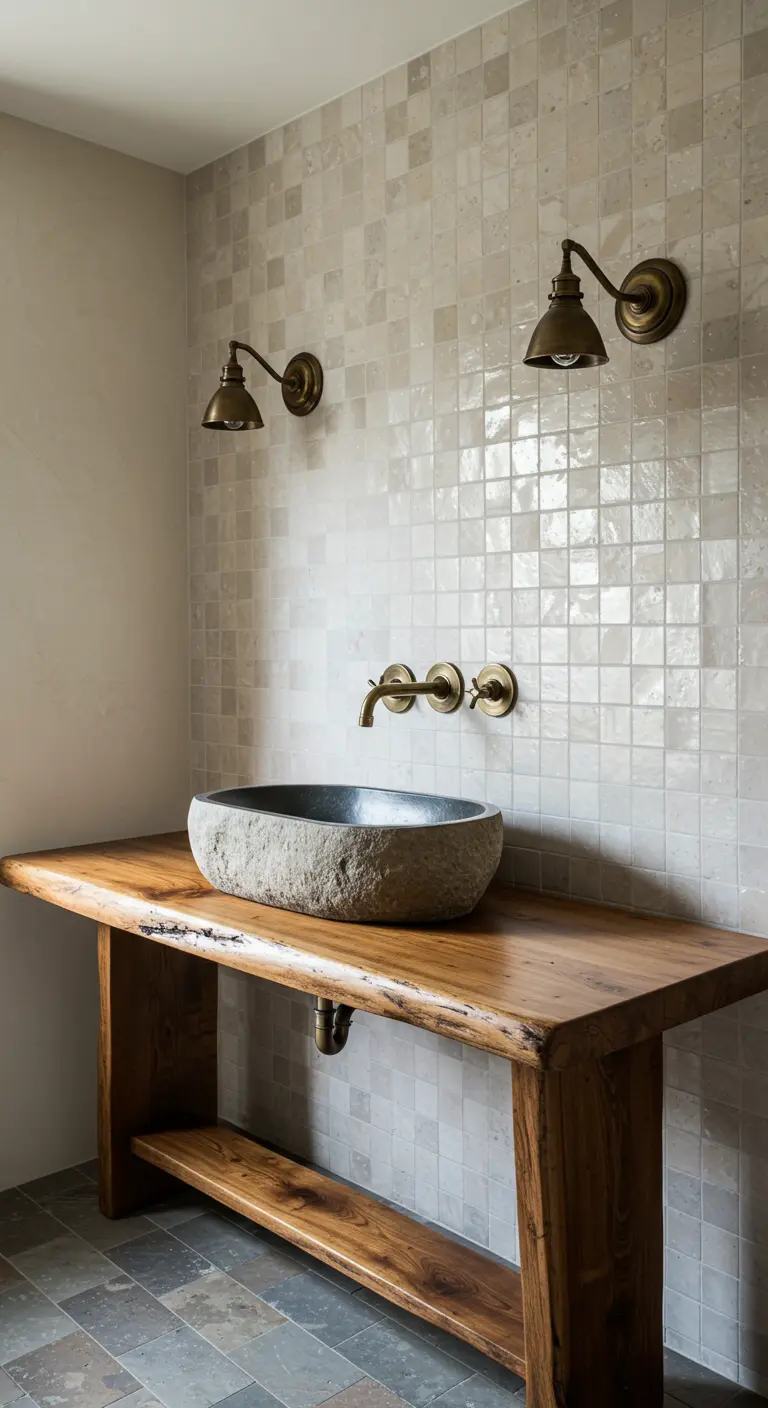
Create a stunning focal point in your bathroom by mounting a rough-hewn stone sink on a live-edge wood vanity.
This pairing celebrates the raw beauty of natural materials, with the cool, solid weight of stone contrasting beautifully against the warm, organic grain of the wood.
Keep the surrounding elements, like the tile and fixtures, simple to allow these statement pieces to shine.
This is a cornerstone of many rustic-chic bathroom inspirations.
20. Design a Space for Open-Air Contemplation
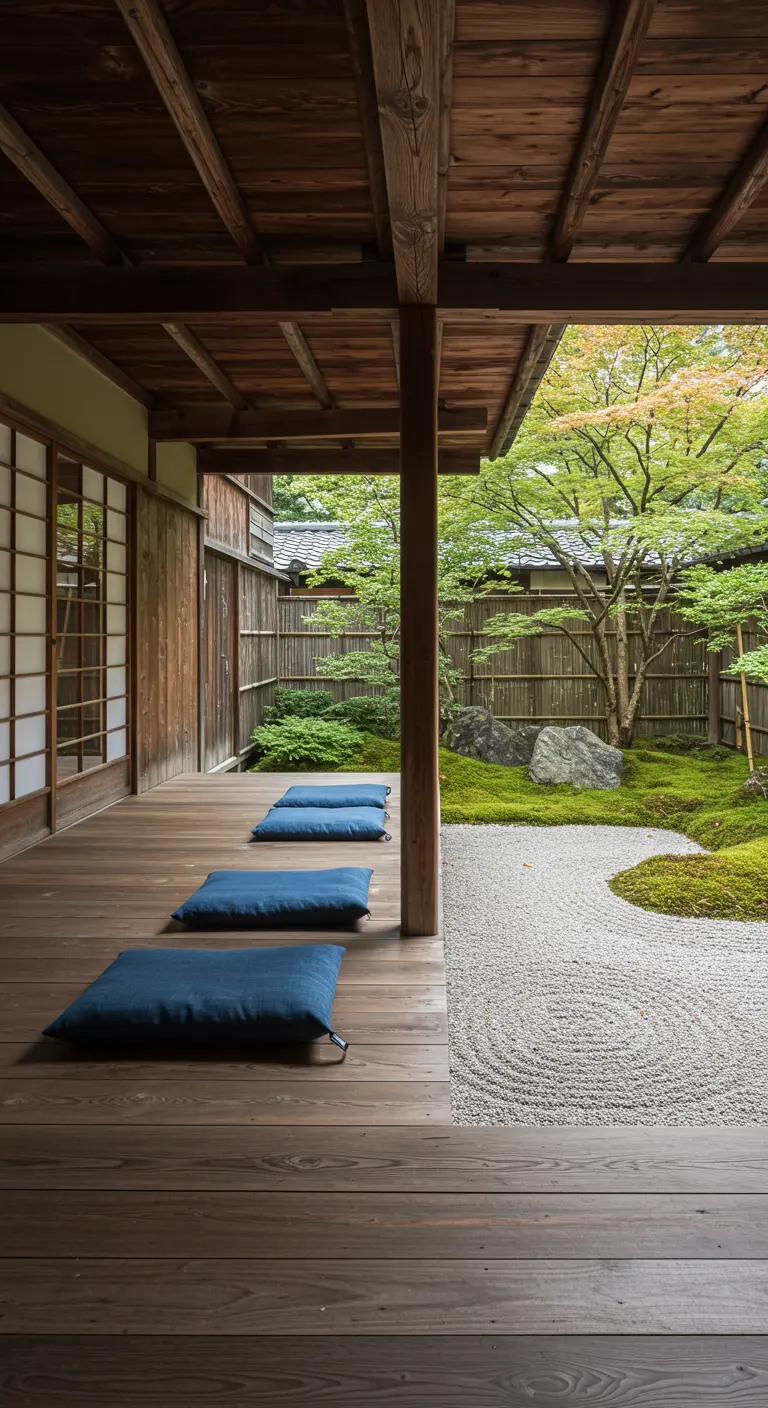
Extend your living space with a covered veranda or porch that seamlessly connects to a garden.
Use natural wood for the decking and ceiling to create a warm, cohesive feel.
Provide simple, low-to-the-ground cushions for seating, encouraging a relaxed and informal connection with the outdoors.
A raked gravel garden and thoughtfully placed greenery can turn even a small patio into one of many urban garden escapes.
21. Use Lighting to Sculpt a Passageway
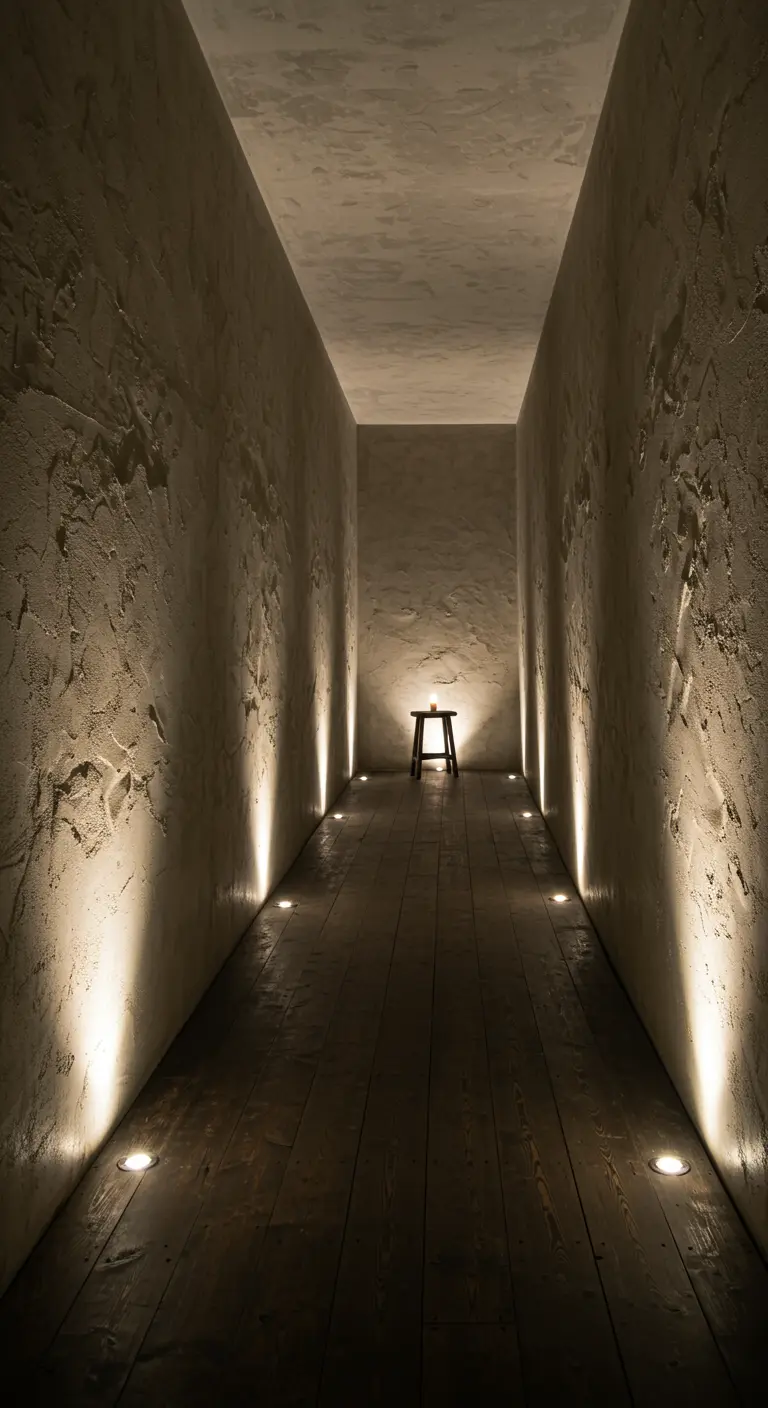
Transform a simple hallway from a transitional area into a deliberate experience.
Install low-level, recessed uplights that wash textured walls with a soft, dramatic glow.
This technique, known as wall grazing, highlights the imperfections and depth of the plaster or stone.
By keeping the focus low and placing a single, simple object at the end of the hall, you create a sense of destination and intrigue, perfect for moody small spaces.
22. Ground a Grand Room with a Historic Rug
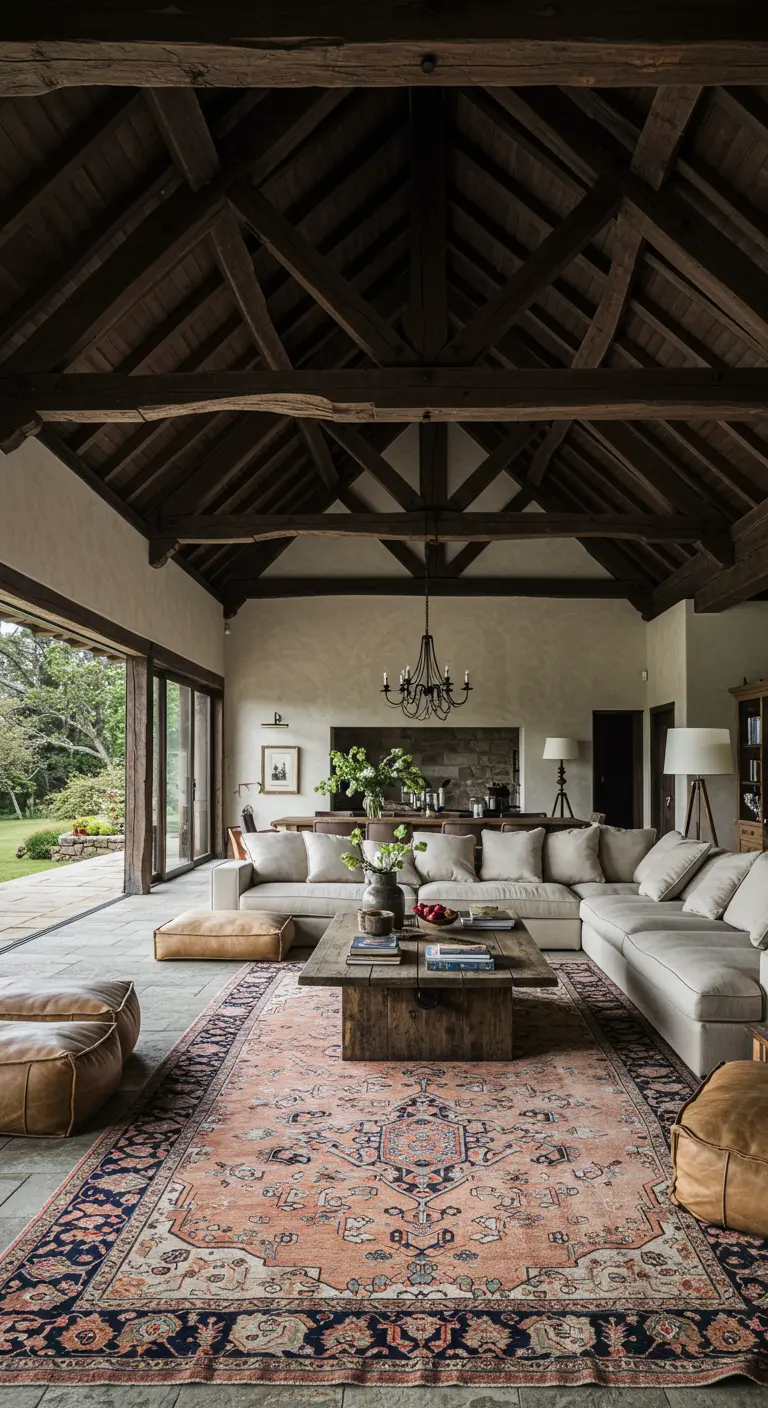
In a large space with high ceilings and grand architecture, an oversized, patterned rug is your most powerful tool.
Choose a vintage or vintage-inspired piece, like a Persian or Turkish rug, whose intricate patterns and faded colors tell a story.
It adds a layer of history, soul, and softness that balances the scale of the room, preventing it from feeling cavernous.
This approach anchors even the most eclectic home designs with a sense of timelessness.
23. Warm Your Kitchen with Terracotta Floors
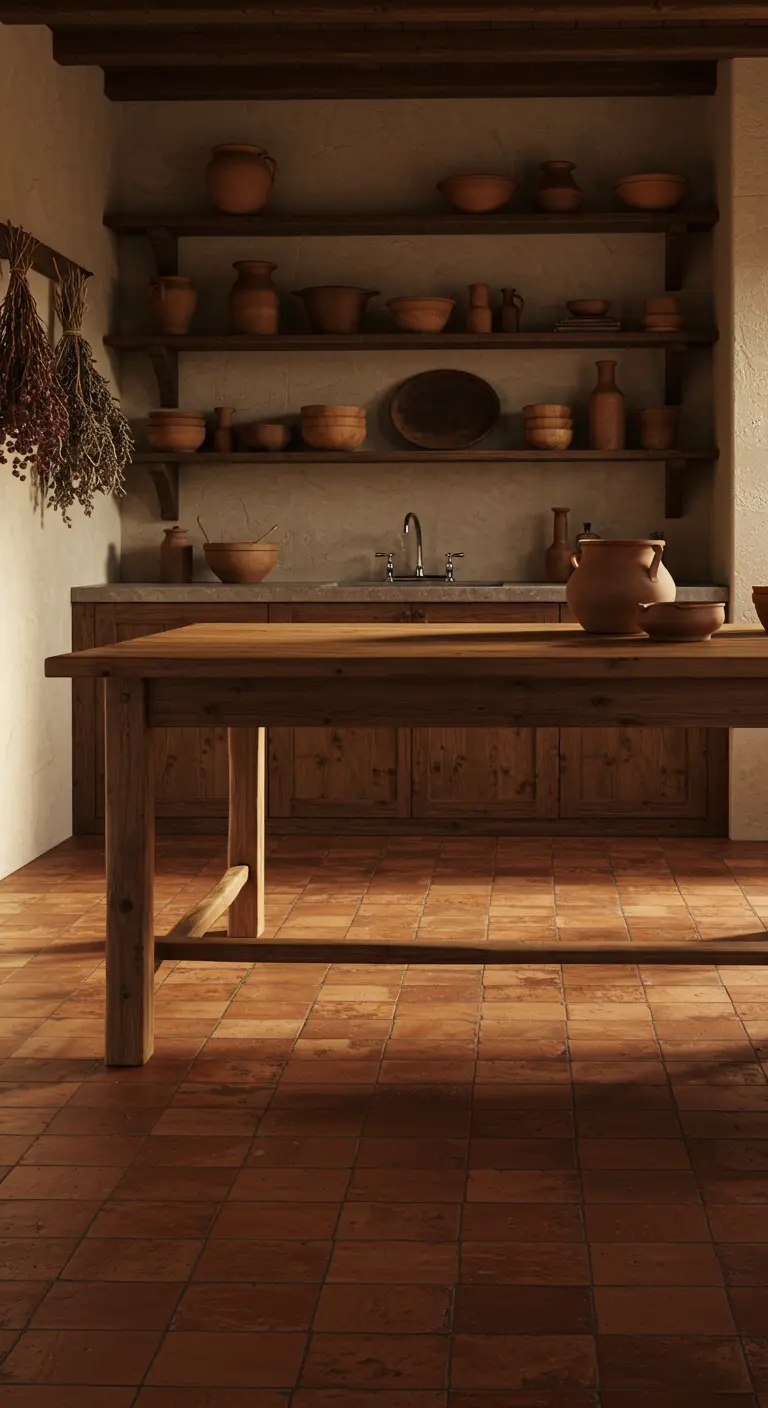
Bring foundational warmth and character to your kitchen with terracotta floor tiles.
The natural color variations and earthy texture of terracotta provide a forgiving and timeless base that pairs beautifully with wood cabinetry and stone countertops.
This material choice instantly infuses a space with a rustic, sun-baked quality that feels both historic and comforting.
It’s a classic element that bridges the gap between modern farmhouse aesthetics and Mediterranean charm.
24. Introduce a Single, Unexpected Pop of Color
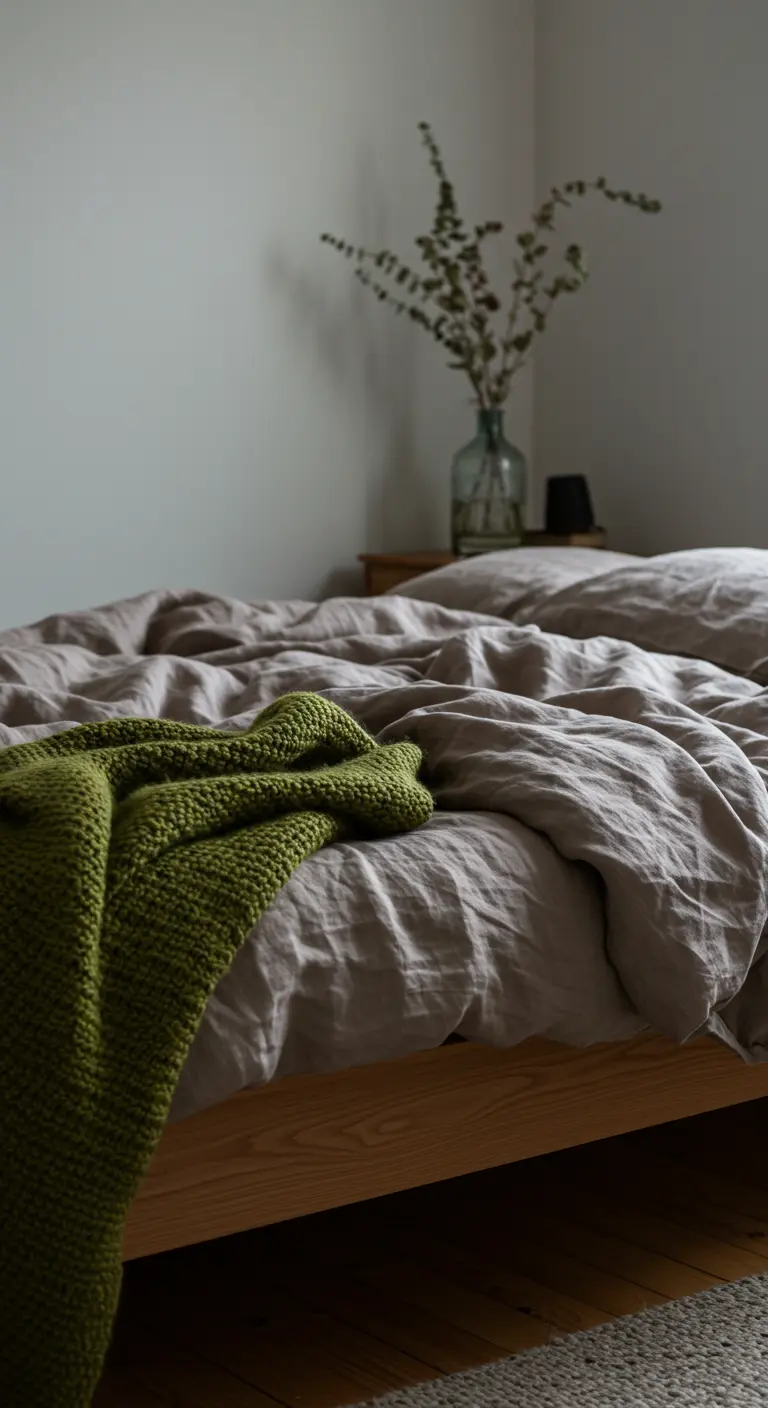
In a neutral, textured bedroom, a single splash of saturated color can have a remarkable effect.
A hand-knit throw blanket in a surprising shade, like this olive green, draws the eye and adds a layer of personality.
The key is to keep it to one single element, so it feels intentional rather than chaotic.
This small addition invigorates the space, making it one of those quietly beautiful, nature-inspired small spaces.
25. Create a Reading Nook with Enduring Style
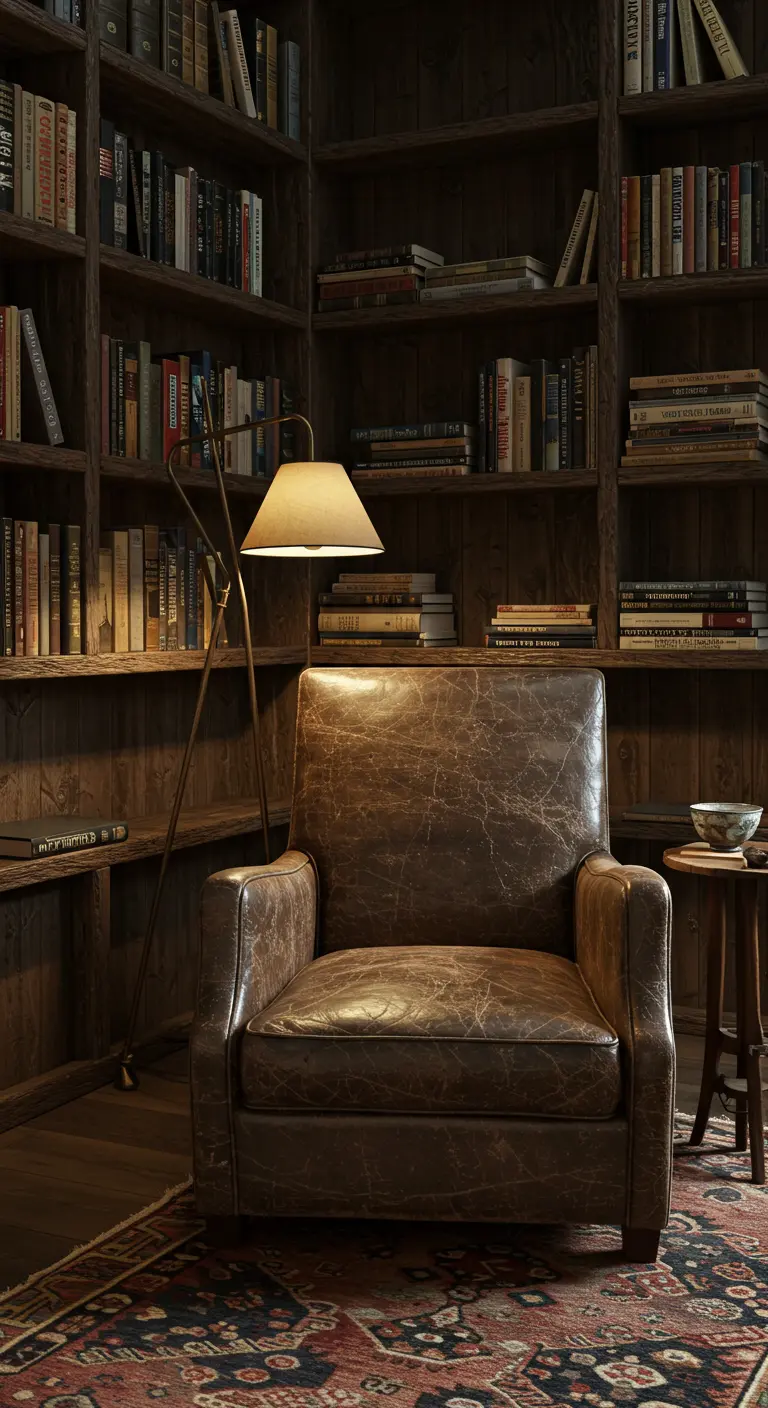
Design a corner that feels like it has been there for years, inviting you to settle in with a book.
Choose a classic leather club chair that will only get better with age, developing a rich patina over time.
Pair it with a simple, functional floor lamp and a small wooden side table for your drink.
Surrounded by floor-to-ceiling bookshelves, this isn’t just a chair—it’s a destination, drawing from the same comfort as enchanted library theme decorations but with a more grounded feel.
